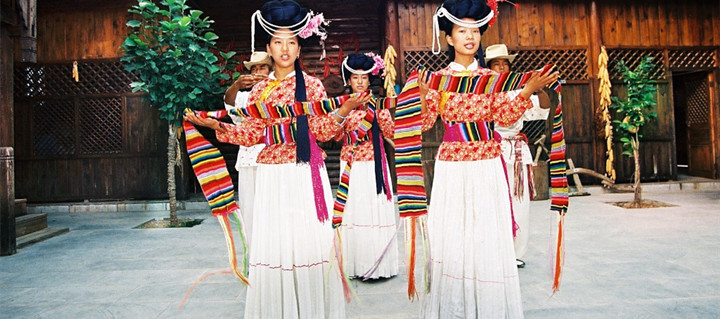

Mosuo people are part of the Naxi ethnic group, one of the China’s 55 ethnic minorities. They live around Lu Gu Lake, which is a high altitude lake almost 2,700 meters above sea level. The lake is completely surrounded by mountains with Yunnan province to the west and Sichuan province to the east. Around the lake there are over a dozen villages inhabited by the Mosuo people.
Mosuo people have an open attitude toward marriage, which doesn’t even exist in its traditional form. If two young people fall in love, the boy goes to the girl’s house to spend the night. Early the next morning, the boy returns to his home, and the girl can call the boy her companion or close friend. Their relationship depends on their feelings for each other. It could last for years, until one side expresses the wish to end the relationship, in which case it can end overnight.


If they have children, it is the female’s responsibility to raise them. In the Mosuo village, the male will take the responsibility of raising his sisters’ children rather than his own. When he grows too old to work, he will be cared for by his nephew. The size of a Mosuo family varies, but a family normally has about 10 people. Some families may count as many as 20 or 30 members, but there is always a female as the head of each one. She is the most capable woman in the family and is highly respected by the others. She has both an honorary status and an important responsibility, as the entire family counts on her to make the wise decisions in handling family affairs.
About 50,000 Mosuo people live around the Lugu Lake, which is over 48 square kilometers in size, so there is plenty of space to build large timber houses, where each family has its own courtyard. Number of rooms each courtyard depends on the size of the family. But in every courtyard, big or small, there is always one room, which stands out from the others. It is normally where the grandmother lives as head of the family. Usually her name is less of a royal chamber than a public hall, as it is also used for offering sacrifices to ancestors, discussing family matters, dining and receptions. However its low ceiling and dark atmosphere can also give it a sense of intimacy. The only light in the room comes from a flame that burns from the coal in a stove-chamber, and behind the stove there is a stone.
The stone is of great importance to the family. It represents the entire family ancestry. It is believed that the souls of past generations live in the stone, so the fire must stay lit all year round to keep them alive and warm. If the flame is extinguished, it means the family is declining. Only when the flame is burning can the family prosper.
The grandmother’s room also holds a big fat piece of meat, symbolizing the wealth of the family. After a pig is butchered, and its viscera and bones removed, the Mosuo people add Chinese prickly ash and salt to the inside of the pig. Then stitch up the skin and dry it a clean and shady place. They usually have to wait 3 to 5 years before they can eat it. To them a steady supply of meat symbolizes their fresh and solid wealth as well as a healthy hearty appetite for both food and money.
Besides a grandmother’s room, there is one special two-storey building, the most beautiful and cleanest in the courtyard. It’s reserved for keeping and chanting Buddhist scriptures.
The Mosuo people are Buddhist. Their beliefs are very much influenced by Tibetan culture and religion since Lake Lugu, where Mosuo people live, is very close to a Tibetan community. This two-storey building exists in every Mosuo family. The Mosuo people used to be very isolated with no raods leading to the outside. But since then roads have been built to connect these villages nestled deep in the mountains to other parts of the country, as well as to open their doors to outside visitors. The lives of the Mosuo people have changed since their increased contact with outside world.
The village of Luoshui, the largest Mosuo village around Lake Lugu, has pretty much become a tourist town. As more and more people come to visit from the outside, many of the residential houses along the lake have been converted to shops, hotels and teahouses. People can taste homemade fruit wine in Mosuo homes or simply have a cup of coffee or tea in a teahouse overlooking the lake. Local Mosuo people also share their daily lives with tourists in activities such as fishing and boating, while in the evening, visitors are invited to participate in the festivities as they dance around the bonfire.
The Mosuo people have their own language but no written characters. In order to protect the culture of the Mosuo ethnic minority, all their schools are bilingual, teaching children in both standard Chinese and Mosuo language. According to a local official, the people seem to be happy to learn from and imitate others, but they are inevitable losing some of their own tradition in the process. The purpose of bilingual education is to help them meet national educational standards on one hand, and to recognize their own language as a valuable asset on the other.
You will only receive emails that you permitted upon submission and your email address will never be shared with any third parties without your express permission.
